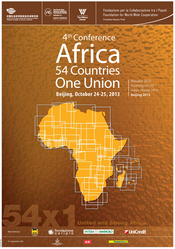Africa: 54 Countries, One Union
Opening Remarks
Excellencies, distinguished scholars,
It is my great pleasure to open the fourth and final conference “Africa: 54 Countries, One Union” here in China.
Being in Beijing for the final conference is not only a great honour for the present importance of China at the global level, but also because China is certainly to be the most important non-African country for the future of Africa.
Since 2010 the Foundation for World Wide Cooperation, in collaboration with the Woodrow Wilson Center for International Scholars, the School of Advanced International Studies of the Johns Hopkins University, the African Union, and the United Nations, has organized three international conferences with the goal of promoting the political and economic cooperation among African states.
For the organization of this fourth conference we have greatly benefitted from the sponsorship of the Ministry of Foreign Affairs of the People’s Republic of China, and the help of the Chinese Academy of Social Sciences and the Institute of West Asian and African Studies.
In 2010 we started in Bologna, and then we had a “walk” around the world. We touched some of the most important places for Africa’s growth and cooperation: Addis Ababa, where the headquarter of the African Union is located.
Then, Washington DC and now Beijing, the capitals of the United States and China: two states that are not only deeply involved in African economics, but which have also great political responsibilities towards the African continent and its growing populations.
Therefore, the different locations of the conferences were not chosen coincidentally, but reflected a particular approach towards the development of Africa.
One of the objectives of the conference series is to discuss, on the basis of the principle of African ownership, the adoption of a coordinated approach towards Africa by international actors such as the European Union, the United States, and China and international and regional institutions such as the African Union, the RECs, the African Development Bank, the United Nations, and the World Bank.
The main goal of the conference in Beijing is to discuss concrete project proposals, especially for those African regions, like Sahel, that have not gained, yet, from the recent growth of the continent.
The title of the conference – Africa 54 Countries: One Union – has never changed, because we still believe that cooperation and even integration among African countries is one of the main conditions for a broad development of the continent.
First of all, “54 Countries, One Union” means a physical union based on a common and modern infrastructure, which is a crucial element for the future growth of Africa.
A variety of recent studies have shown that that poor state of roads, rails and harbors can add from 30 to 40% to the cost of goods traded among African countries.
Infrastructure is an element that interests all economic sectors and all African states, thus requiring particular attention and cooperation among countries. Without an efficient and common infrastructure the economic gaps of Africa will never been overcome.
The lack of energy infrastructure is the most relevant barrier towards growth and higher living standards for African populations.
Indeed, two-thirds of Africans do not have regular access to electricity: something that I can describe only as a shocking statistics that reflects a grim reality.
In the area of energy, the use of new technology has a great potential, in particular for small scale solar energy projects at the community level. Solar energy can work effectively and quickly in areas where no grid is present because of a very low density of the population.
The use of the new technology might be critical in other areas such as water sanitation, mass vaccination of cattle with portable kits, information systems for market access of agricultural goods; distant medical control for first aid therapies by non-medical personnel, and distant learning for communities with no access to schools and teachers.
Apart from the problem of infrastructure, the title of the Conference Africa: 54 Countries, One Union means also economic integration. In particular, it means a real common African market.
Most African economies are still too small to work as efficient markets. If African countries want to become makers of their own destiny, they need to cooperate among each other and not to be afraid of opening their markets to other African economies.
A single African market is a pre-condition for continental growth. It is, especially, a pre-condition for a real manufacture industry based on the best-technologies, because only with a big continental market, more and more foreign capitals can be attracted.
Today, we know that some African countries are going towards a common market. But as it often happens, the results are likely to be limited and far from those expected and needed.
In order to create economies of scale, the physical barriers and market distortions that obstruct the development of Africa should be gradually removed. Here market integration is a potential solution.
I hope the issues discussed and the proposals presented at the conference, concerning both economic integration and common infrastructure, will contribute to both short and long term sustainable development.
I’m confident that this conference will develop ideas towards concrete projects, especially in light of the new technology that, if employed extensively, can change the economic and social reality of Africa.
Let me wish you a productive conference and let me thank our partners of the Woodrow Wilson Centre and the Johns Hopkins University. But this time, I would like to thank especially, for their hospitality and help in organizing this conference, our Chinese hosts, the Ministry of Foreign Affairs, the Chinese Academy of Social Sciences and the Institute of West Asian and African Studies.
Thank you!













